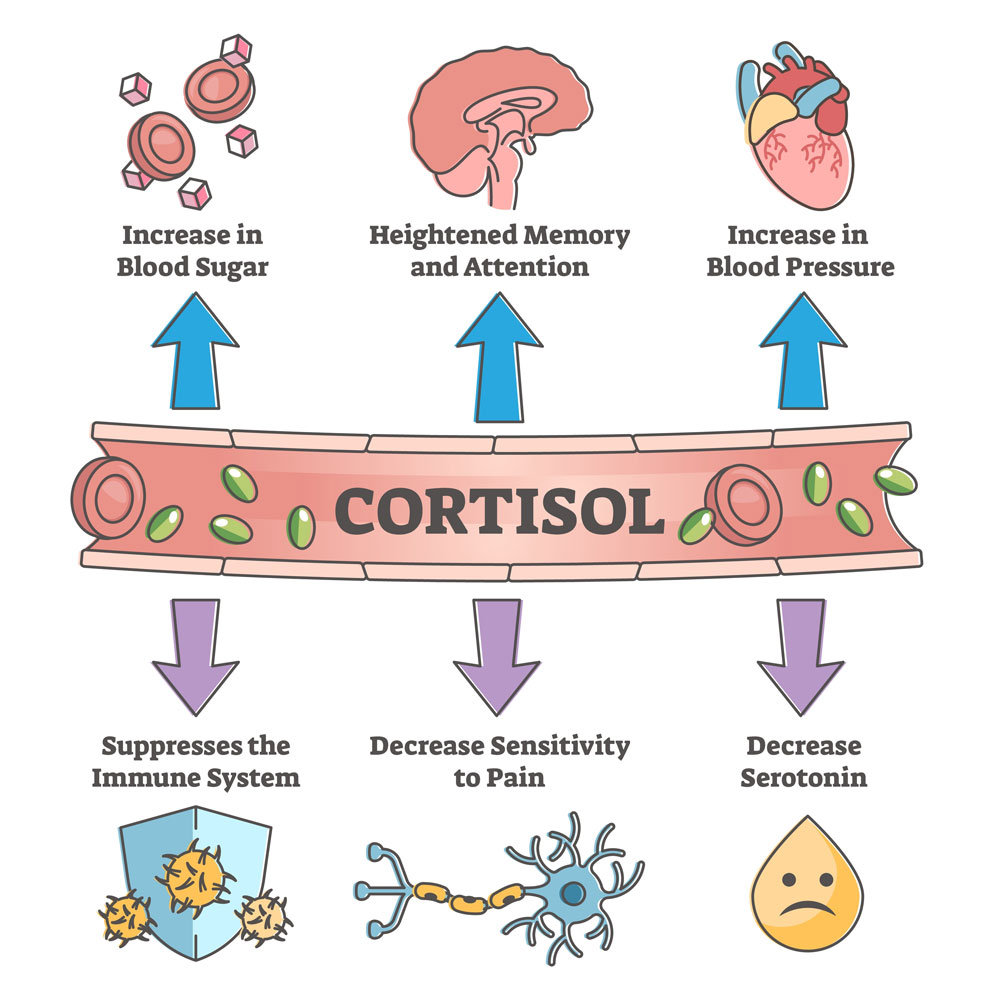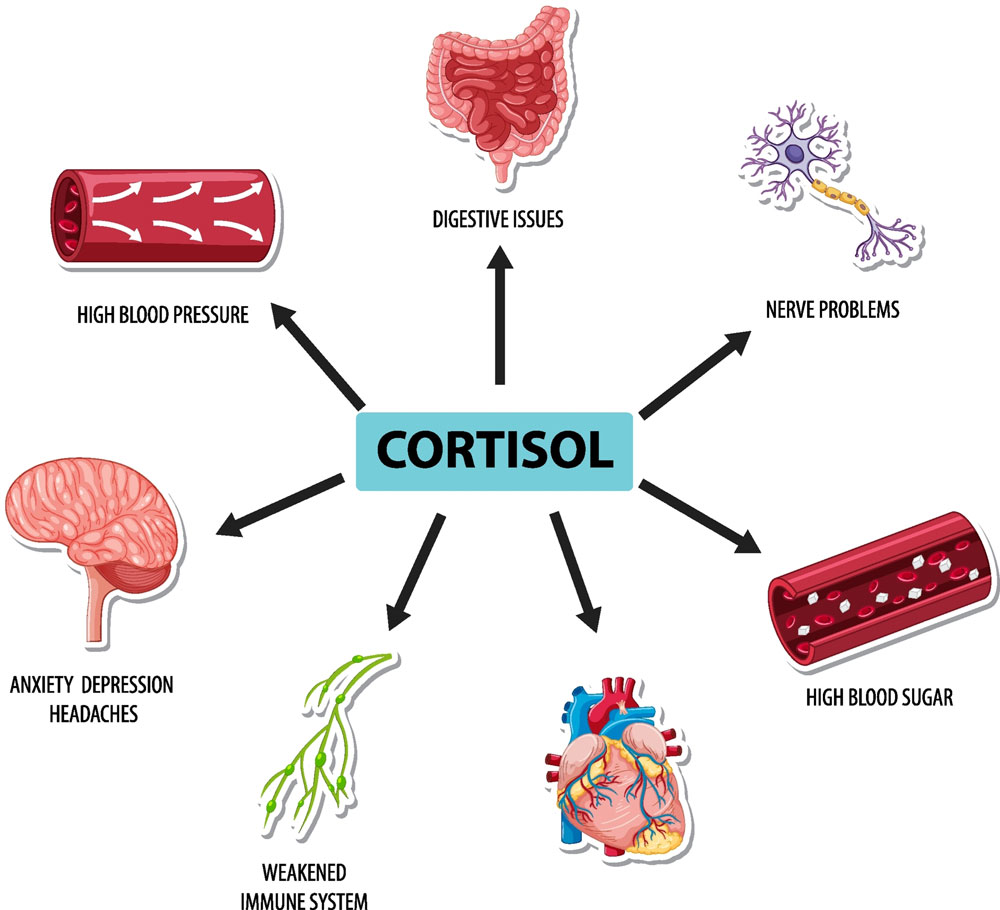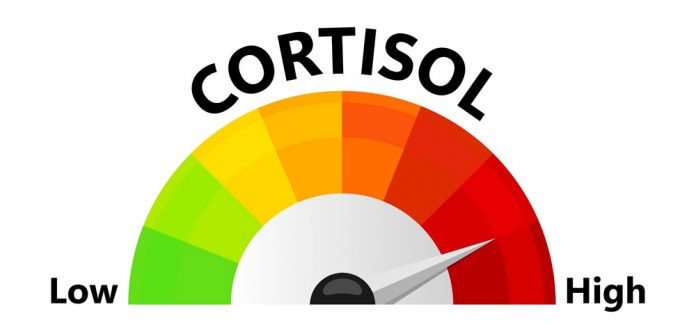Cortisol is a steroid hormone released by the adrenal glands —the endocrine glands on top of your kidneys. Cortisol affects several key aspects of your body and mainly helps regulate your body’s response to stress.
Hormones are key chemicals that coordinate different functions in your body by carrying messages through your blood to your organs, skin, muscles and other tissues. These signals tell your body what to do and when to do it.
Your adrenal glands, also known as suprarenal glands, are small, triangle-shaped glands that are located on top of each of your two kidneys. They’re a part of your endocrine system.
Cortisol: Breaking it down:
Cortisol is a glucocorticoid hormone that your adrenal glands produce and release.
Glucocorticoids are steroid hormones produced from the cortex of adrenal glands (gluco-corti-coids: glucose-cortex-steroids).
Glucocorticoids have a pivotal role in the glucose, protein, and fat metabolism of the body.
They suppress inflammation in all of your bodily tissues and control metabolism in your muscles, fat, liver and bones.
Glucocorticoids also affect your sleep-wake cycles. Glucocorticoids are not the infamous anabolic steroids that are used by athletes for muscle buildup. Instead, these are the catabolic steroids that cause peripheral muscle breakdown. The essential glucocorticoid in the body is cortisol. It is released in a diurnal (active or happening during the day rather than at night) circadian pattern, with the highest levels released at around 8 AM and its lowest levels between midnight and 4 AM.
Cortisol is an essential hormone that affects almost every organ and tissue in your body. It plays many important roles, including:
- Regulating your body’s stress response
- Helping control your body’s use of fats, proteins and carbohydrates, or your metabolism
- Suppressing inflammation
- Regulating blood pressure
- Regulating blood sugar
- Helping control your sleep-wake cycle
Your body continuously monitors your cortisol levels to maintain steady levels (homeostasis). Higher-than-normal or lower-than-normal cortisol levels can be harmful to your health.
Cortisol’s link to stress
Cortisol is widely known as the “stress hormone.” However, it has many important effects and functions throughout your body aside from regulating your body’s stress response.
It’s also important to remember that, biologically speaking, there are multiple kinds of stress, including:
Acute stress: Acute stress happens when you’re in sudden danger within a short period of time. For example, barely avoiding a car accident or being chased by an animal are situations that cause acute stress.
Chronic stress: Chronic (long-term) stress happens when you experience ongoing situations that cause frustration or anxiety. For example, having a difficult or frustrating job, relationship, lifestyle challenge or having a chronic illness can cause chronic stress.
Traumatic stress: Traumatic stress happens when you experience a life-threatening event that induces fear and a feeling of helplessness. For example, a sudden traumatic death of a loved one, experiencing an extreme weather event, such as an earthquake, or experiencing war or sexual assault can cause traumatic stress. In some cases, these events can lead to post-traumatic stress disorder (PTSD).
Your body releases high levels of cortisol when you experience any of these types of stress.
The effects of cortisol on your body
Almost all tissues in your body have glucocorticoid receptors.
Because of this, cortisol can affect nearly every organ system in your body, including:
- Nervous system
- Immune system
- Cardiovascular system
- Respiratory system
- Reproductive systems
- Musculoskeletal system
- Integumentary system (skin, hair, nails, glands and nerves).
Normal cortisol levels work in your body in the following ways:
Regulating your body’s stress response
During times of stress, your body can release cortisol after releasing its “fight or flight” hormones, such as adrenaline, so you continue to stay on high alert. In addition, cortisol triggers the release of glucose (sugar) from your liver for fast energy during times of stress.
Regulating metabolism
Cortisol helps control how your body uses fats, proteins and carbohydrates for energy.
Suppressing inflammation
In short spurts, cortisol can boost your immunity by limiting inflammation.

The dangers of consistent high cortisol in our body
If you have consistently high levels of cortisol, your body can get used to having too much cortisol in your blood, this can lead to the following conditions:
Chronic Inflammation
Chronic inflammation and a weakened immune system go hand in hand, the combination results in low- immunity conditions like constant allergies, asthma, IBS (Irritable Bowel Syndrome) and auto-immune diseases.
High blood pressure
The exact way in which cortisol regulates blood pressure in humans is unclear. However, elevated levels of cortisol can cause high blood pressure, and lower-than-normal levels of cortisol can cause low blood pressure.
Increasing blood sugar
Under normal circumstances, cortisol counterbalances the effect of insulin. Cortisol raises blood sugar by releasing stored glucose, while insulin lowers blood sugar. Chronically high cortisol levels inhibit the function of insulin, and the body remains in a general insulin-resistant state when cortisol levels are chronically elevated. Over time, the pancreas struggles to keep up with the high demand for insulin, glucose levels in the blood remain high, and the cycle continues. This can cause Type 2 diabetes.
Your sleep-wake cycle can get disturbed
Under regular circumstances, you have lower cortisol levels in the evening when you go to sleep and peak levels in the morning right before you wake up. This suggests that cortisol plays a significant role in the initiation of wakefulness and plays a part in your body’s circadian rhythm.
Metabolic imbalance leading to weight gain and obesity

Repeated elevation of cortisol can lead to weight gain in the following ways;
One way is via visceral fat storage. Cortisol can mobilise triglycerides from storage and relocate them to visceral fat cells (those under the muscle, deep in the abdomen).
A second way in which cortisol may be involved in weight gain goes back to the blood sugar-insulin problem. Consistently high blood glucose levels along with insulin suppression lead to cells that are starved of glucose. But those cells are crying out for energy, and one way to regulate is to send hunger signals to the brain. This can lead to overeating and increased insulin production. And, of course, unused glucose is eventually stored as body fat.
Another connection is cortisol’s effect on appetite and cravings for high-calorie foods. Studies have demonstrated a direct association between cortisol levels and calorie intake in populations of women. Cortisol may directly influence appetite and cravings by binding to hypothalamus receptors in the brain. Cortisol also indirectly influences appetite by modulating other hormones and stress responsive factors known to stimulate appetite. Consistently elevated cortisol levels can cause cravings for sweet, fatty and salty foods. This means you’re more likely to indulge in unhealthy food choices, than opt for a well-balanced meal.
And yet another way, is that an excess of cortisol also can lead your body to produce less testosterone. This may cause a decrease in muscle mass, as well as slow down how many calories your body burns.
Optimum cortisol levels are necessary for life and for maintaining several crucial bodily functions. If you have consistently high or low cortisol levels, it can have negative impacts on your overall health.
How does your body control cortisol levels?
The human body has an elaborate system to regulate your cortisol levels.
Your hypothalamus, a small area of your brain involved in hormonal regulation, and your pituitary gland, a tiny gland located below your brain, regulate the production of cortisol in your adrenal glands.
When the levels of cortisol in your blood fall, your hypothalamus releases corticotropin-releasing hormone (CRH), which directs your pituitary gland to produce adrenocorticotropic hormone (ACTH). ACTH then stimulates your adrenal glands to produce and release cortisol.
In order to have optimal levels of cortisol in your body, your hypothalamus, pituitary gland and adrenal glands must all be functioning properly.

What tests can check cortisol levels?
Diagnostics can measure your cortisol levels through blood, urine, or saliva tests. Your doctor will determine which test is best depending on your symptoms.
Optimal cortisol levels
The level of cortisol in your blood, urine and saliva normally peaks in the early morning and declines throughout the day, reaching its lowest level around midnight. This pattern can change if you work a night shift and sleep at different times of the day.
For most tests that measure cortisol levels in your blood, the normal ranges are:
6 a.m. to 8 a.m.: 10 to 20 micrograms per deciliter (mcg/dL).
Around 4 p.m.: 3 to 10 mcg/dL.
Normal ranges can vary from lab to lab, time to time and person to person. If you need to get a cortisol level test, your doctor will interpret your results and let you know if you need to get further testing.
Physiological causes of high cortisol
Experiencing abnormally high levels of cortisol (hypercortisolism) for an extended period of time is usually considered Cushing’s syndrome, which is a rare condition. Causes of higher-than-normal cortisol levels and Cushing’s syndrome include:
Taking large amounts of corticosteroid medications, such as prednisone, prednisolone or dexamethasone for treatment of other conditions.
Tumours that produce adrenocorticotropic hormone (ACTH). These are usually found in your pituitary gland. More rarely, tumours in other parts of your body such as your lungs can cause high cortisol levels.
Adrenal gland tumors, or excessive growth of adrenal tissue (hyperplasia), which cause excess production of cortisol.

The symptoms of high cortisol levels
The symptoms of Cushing’s syndrome depend on how elevated your cortisol levels are. Common signs and symptoms of higher-than-normal cortisol levels include:
- Weight gain, especially in your face and abdomen.
- Fatty deposits between your shoulder blades.
- Wide, purple stretch marks on your abdomen (belly).
- Muscle weakness in your upper arms and thighs.
- High blood sugar, which often turns into Type 2 diabetes.
- High blood pressure (hypertension).
- Excessive hair growth (hirsutism) at birth.
- Weak bones (Osteoporosis) and fractures.
The causes low levels of cortisol
Having lower-than-normal cortisol levels (hypocortisolism) is considered adrenal insufficiency. There are two types of adrenal insufficiency: primary and secondary. The causes of adrenal insufficiency include:
- Primary adrenal insufficiency: Primary adrenal insufficiency is most commonly caused by an autoimmune reaction in which your immune system attacks healthy cells in your adrenal glands for no known reason. This is called Addison’s disease. Your adrenal glands can also become damaged from an infection or blood loss to the tissues. All of these situations limit cortisol production.
- Secondary adrenal insufficiency: If you have an underactive pituitary gland (hypopituitarism) or a pituitary tumor, it can limit ACTH production. ACTH signals your adrenal glands to make cortisol, so limited ACTH results in limited cortisol production.
- You can also have lower-than-normal cortisol levels after stopping treatment with corticosteroid medications, especially if you stop taking them very quickly after a long period of use.
The symptoms of low cortisol levels
Symptoms of lower-than-normal cortisol levels, or adrenal insufficiency, include:
- Fatigue
- Unintentional weight loss
- Poor appetite
- Low blood pressure (hypotension)
How do you reduce cortisol levels?
If you have Cushing’s syndrome (very high levels of cortisol) you’ll need medical treatment to lower your cortisol levels. Treatment usually involves medication and/or surgery. You’ll also need medical treatment if you have lower-than-normal cortisol levels.
In general, though, there are several everyday things you can do to try to lower your cortisol levels and keep them at optimal ranges, including:
- Get quality sleep
- Chronic sleep issues, such as obstructive sleep apnea, insomnia or working a night shift, are associated with higher cortisol levels.
- Exercise regularly
- Several studies have shown that regular exercise especially after waking up in the morning, helps improve sleep quality and reduce stress, which can help lower cortisol levels over time.
- Learn to limit stress and stressful thinking patterns
- Being aware of your thinking pattern, breathing, heart rate and other signs of tension helps you recognise stress when it begins and can help you prevent it from becoming worse. Meditation, calming yoga, healing therapy can help in de stressing.
- Practice deep breathing exercises
- Controlled breathing helps stimulate your parasympathetic nervous system, your “rest and digest” system, which helps lower cortisol levels.
- Enjoy yourself and laugh
- Laughing promotes the release of endorphins and suppresses cortisol. Participating in hobbies and fun activities can also promote feelings of well-being, which may lower your cortisol levels.
- Maintain healthy relationships
- Relationships are a significant aspect of our lives. Having tense and unhealthy relationships with loved ones or coworkers can cause frequent stress and raise your cortisol levels.
When should you see a doctor about your cortisol levels?
If you experience symptoms of Cushing’s syndrome or adrenal insufficiency, or if you’re concerned about your daily stress levels, learn about steps you can take to minimise your stress and stay healthy. Take the advice of a trusted doctor or therapist.
A Final note:
Cortisol is an essential but complicated hormone that impacts several key aspects of your body. Being aware and understanding its impact on your mind and body can go a long way in achieving and maintaining you well-being. Studies are inconclusive on whether cortisol and depression are linked, but it is important to be aware of your stress levels and learn to recognize and limit your triggers, therefore doing your bit to manage your cortisol levels.








